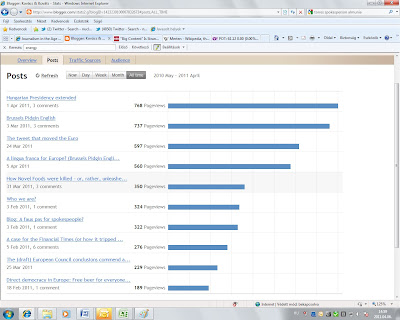In our experience, public opinion does not distinguish between the European Parliament, Council, Commission, etc. The images of the institutions are not distinct of each other and citizens (rightly) look at the EU as one "organisation". Outside of Brussels, not much attention is paid to institutional infighting, or "internal coordination challenges".
These challenges have worsened since the entry into force of the Lisbon Treaty due to the emergence of two extra players on the scene and new competencies to some of the old players. We hope the Lisbon Treaty was an important step forward (although we sometimes wonder in which direction), but it sure raised quite a few communication challenges to be tackled.
This is how ”speaking with one voice” has become a
buzzword around Rond-point Schuman (where the Commission and Council HQs are located). As usual with buzzwords, they are (ab)used to an extent that blurs their original meaning.
Here we try to bring a few examples from our daily communication work and examine whether speaking with one voice is feasible at all and how it effects the substance of policies.
A negative example - the Novel Food case
Tuesday (29/03) morning at 7 am, following 12 hours of negotiations, the last round of conciliation on the Novel Food regulation ended in failure due to disagreement on food derived from the offspring of cloned animals (there was general agreement on a ban on clones). In our previous post, we gave detailed account of the 12-hour negotiating marathon (see
here).
The reaction of the Council and the European Parliament has been very predictable: blaming each other (and the Commission) for the failure of negotiations.
The EP fired the first shot with a press release (see
here) claiming: "It is deeply frustrating that Council would not listen to public opinion and support urgently needed measures to protect consumer and animal welfare interests”
Of course, the political group of the EP rapporteur (GUE/NGL) has complemented it with its own, though shorter version (see
here), claiming that “Council and Commission closed their ears to MEPs and the 77% of Europeans who want a ban on food from cloned animals.” The Parliament added a press conference on the subject, where only MEPs were present.
We answered, quoting our minister in charge: “The EP chose to go down the road of political grandstanding and tried to push the Council to accept a misleading, unfeasible “solution” that in practice would have required drawing a family tree for each slice of cheese or salami” (see our masterpiece
here). The Press Office at the Council General Secretariat has also prepared a press release, less straightforward, but still claiming that “The discussion failed because of European Parliament's inability to compromise…”
Commissioner Dalli has appeared at the Commission’s midday press conference on the issue, where he took a rather neutral view (see his statement
here). He refrained from blaming the collapse of the talks on any of the parties, which was rather elegant, taking into account earlier criticism directed at him.
Without trying to decide who is right and who is wrong, let’s just look at it from an outside perspective. These are five press releases (and two press conferences), with opposing statements. It must be hard for any informed journalist to gather what happened and what is the truth, let alone for a citizen to follow the events. (We are not blaming anyone, because Kovács and Kováts were part of it, we are all swimming with the tide and just reacting to what the other side said.)
We are wondering, however, if we could have perhaps organized one single press conference where everyone is invited and have the chance to collide arguments? Could we not refer to each other’s opinion in the press releases (minimum option) or even try to publish joint press releases (maximum option)? This would definitely help the image of the Union and the understanding of our decision-making process.
(NB: in this case, the institutions were at least “silent with one voice”: while everyone was talking about different aspects of cloning, nobody even mentioned the issue of delegated acts vs. implementing acts, which seemed to be just as important as consumer protection.)
The positive example - press release on Libya
The Council Press people had enough of the cacophony raging in foreign policy and a few weeks ago called a meeting between the Commission, External Action Service and the Hungarian Presidency to bring some coordination into the system. They pushed us until we approved joint lines on Libya, which are being updated ever since. Thus people could read the same basic information on all
websites. Although, we have to improve on updating it, but it is already a promising start. (See the
Presidency's and
Council’s updated version, the EEAS’s slightly outdated version
here, the Commission’s very old version
here.)
The point we are trying to make is that institutions represent different interests and thus have different opinions. This is democratic decision-making, where debate should be welcome. But debate is not the same as the blame-game, which will hurt us all in the long run.













